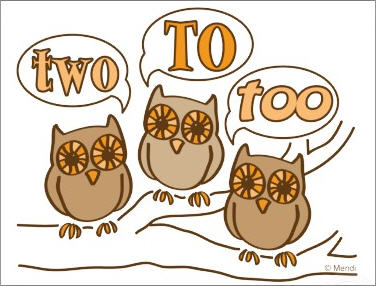 Welcome to Part TWO of Vexing Vocabulary. Part ONE covered ME, MYSELF, & I, LESS/FEWER, YOUR/YOU’RE, ITS/IT’S, EFFECT/AFFECT, and TOWARD/TOWARDS. If you’d like TO read that TOO, here’s the link: Vexing Vocabulary Part 1
Welcome to Part TWO of Vexing Vocabulary. Part ONE covered ME, MYSELF, & I, LESS/FEWER, YOUR/YOU’RE, ITS/IT’S, EFFECT/AFFECT, and TOWARD/TOWARDS. If you’d like TO read that TOO, here’s the link: Vexing Vocabulary Part 1
Grammar and vocabulary are near and dear to my heart, and my goal is TO make them fun and understandable for all. Thanks for your input on what should be included in Part TWO‘s list. This time around, I’ve separated the words into TWO categories:
THE GRAMMAR VEXERS:
#1: GOOD/WELL #2: LIE/LAY #3: EVERYDAY/ EVERY DAY
#4: UNTIL/TILL/’TIL #5: AGGRAVATE/IRRITATE
THE HOMOPHONE LIGHTNING ROUND:
#6: EXCEPT/ACCEPT #7: LOSE/LOOSE #8: PAST/PASSED #9: PEEK/PEAK/PIQUE
And here they are…THE GRAMMAR VEXERS!
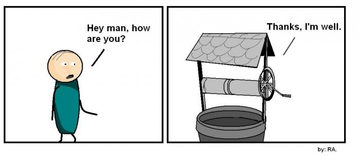
#1: GOOD/WELL
Have any of you heard or said, “I’m GOOD!” in response to “How are you?” You may be surprised to learn that “I’m GOOD” is grammatically acceptable.
Here’s why: the “am” in “I’m” is a special type of verb known as a linking verb. Other common linking verbs include seems, feels, looks, tastes, sounds, and all forms of to be. It turns out that GOOD works with all of these! TASTES GOOD, SOUNDS GOOD, LOOKS GOOD, and FEELS GOOD are all…GOOD!
Here’s an example from the The Secret Sky by Atia Abawi:
- “It feels so GOOD to be able to talk to him again.” (p. 20)
So when is WELL used?
WELL is an adverb that fits with all verbs except the linking type. The placement of GOOD after an action verb is an especially big no-no! Here are two simple examples:
- Mary performed WELL at the audition.
- John swam WELL at yesterday’s meet.
WELL is also appropriate when referring to your or someone else’s health. Here’s another example from The Secret Sky:
- “My grandmother isn’t feeling WELL.” (p. 21)
 #2: LIE/LAY
#2: LIE/LAY
If these words vex you, consider yourself in excellent company. I will do my very best to help you become unvexed!
The Wizard’s Dog by Eric Khan Gale is the perfect book to help clear up this confusion. A dog called Nosewise narrates this terrific story, and all commands are shown with capital letters. I will concentrate my explanations on the PRESENT and PAST tenses.
PRESENT Tense:
LIE is an action one does for oneself. It typically means to be in a flat position on the floor or other surface. It is also appropriate to command another person or animal to do it.
- Sure, Merlin eventually taught me to Shake! and LIE down!, and I got treats and praise when I did them. (p. 11)
LAY is used when you’re acting on someone (even a part of yourself) or something else. You can LAY a book upon a table, LAY your hand on someone else’s shoulder or your own heart, or LAY down your life like in the quote below.
- “I LAY down my life too!” (Arthur’s voice, p. 231)
PAST Tense:
LAY is the past tense form of LIE! Now you know why you’ve been confused!
- Merlin’s staff and Asteria LAY on the stone, cold and untouched. (p.241)
LAID is the past of LAY!
- They LAID their weapons on the ground and shielded their eyes. (p. 257)
While I won’t discuss the other tenses, I’ll leave you with this chart that shows LIE and LAY in all their glorious forms.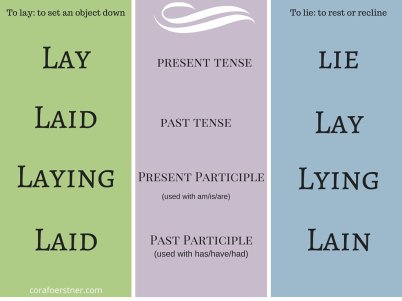
#3: EVERYDAY/EVERY DAY
I’ve seen these words confused more times than I can count. Please believe me when I tell you this: they aren’t interchangeable!
 EVERYDAY is an ADJECTIVE! It means typical or average.
EVERYDAY is an ADJECTIVE! It means typical or average.
- My EVERYDAY routine starts with coffee and a book.
EVERY DAY means each day: EVERY is an ADJECTIVE and DAY is a NOUN.
- You should wash your face EVERY DAY. (When? EVERY DAY! At least once!)
- You could also write, “You should wash your face each DAY” or “You should wash your face once a DAY.”
#4: UNTIL/TILL/’TIL
 I confess to being confused by these myself, and I imagine that I’m not alone. According to the Chicago Manual of Style and well-respected Grammar Girl Mignon Fogarty, UNTIL and TILL are separate words. TILL actually predates UNTIL, though the words mean the same thing.
I confess to being confused by these myself, and I imagine that I’m not alone. According to the Chicago Manual of Style and well-respected Grammar Girl Mignon Fogarty, UNTIL and TILL are separate words. TILL actually predates UNTIL, though the words mean the same thing.
The biggest difference is that UNTIL is considered more formal and always appropriate, while TILL should be reserved for casual dialogue. I personally find TILL awkward, since it also means a drawer for money or to cultivate crops.
Now for the shocker: ’TIL is NOT (or no longer, if one reads between the lines of style manuals) an acceptable abbreviation for UNTIL! For all the times I crossed out TILL and wrote ’TIL instead, I apologize. I certainly won’t make that mistake anymore- and now, neither will you!
So from now on, I’m sticking with UNTIL.
#5: AGGRAVATE/IRRITATE
 Using these words interchangeably really IRRITATES me. You may be wondering why it doesn’t AGGRAVATE me instead. Some online dictionary resources consider these words synonyms, and on an SSAT, I would agree they are close enough. But AGGRAVATE implies the worsening of an existing condition, problem, or situation, while IRRITATE is most appropriate when you or your character are newly annoyed, inflamed, or vexed.
Using these words interchangeably really IRRITATES me. You may be wondering why it doesn’t AGGRAVATE me instead. Some online dictionary resources consider these words synonyms, and on an SSAT, I would agree they are close enough. But AGGRAVATE implies the worsening of an existing condition, problem, or situation, while IRRITATE is most appropriate when you or your character are newly annoyed, inflamed, or vexed.
Here are some examples to show the distinction:
- Falling into a patch of poison ivy caused Ginger’s skin to become IRRITATED.
(Ginger’s skin wasn’t inflamed prior to falling into the poison ivy patch.)
- Mr. Marshall’s inflammatory comments served to AGGRAVATE an already tense meeting.
(Mr. Marshall’s comments worsened an already bad situation.)
On your mark, get set, it’s time for the HOMOPHONE LIGHTNING ROUND!
Homophones sound alike, which is why they are frequently mixed-up. Keeping them straight isn’t a matter of learning rules, but of coming up with rhymes, acronyms, or other memory joggers (mnemonics, if you want to get fancy) to figure out
witchwhich is which.
If asked to recite all the coordinating conjunctions, you might reply, “What? Who?” But if asked to recite the FANBOYS of grammar, you’d happily reply, “for, and, nor, but, or, yet, and so.”
I’ll do my best to come up with memory-joggers for these tricky homophones …but if you know of any clever mnemonics for these, please share!

#6: LOSE/LOOSE:
LOSE means to become deprived of something or to fail.
LOOSE means not tight or able to be detached.
- Remember to zip your coin purse or your coins will get LOOSE. And if you LOSE money, the chance of retrieval is slim.
- Win or LOSE: it’s still fun to play the game.
- Tight or LOOSE: there’s no way to restrain a MOOSE.
#7: PASSED/PAST
PAST means in a time gone by.
- I went to Roaring Brook Elementary School in the distant PAST. Since time speeds by FAST, that may help you remember how to spell PAST.
PASSED refers to achieving a certain grade on a test or being overtaken on the street or highway.
- John PASSED the exam, but he SASSED the teacher so much, he failed to receive the grade he expected.
You could also come up with a mnemonic using the SS in PASSED. Here is my attempt:
- Sally’s sedan PASSED Sarah’s on the straight stretch of street.
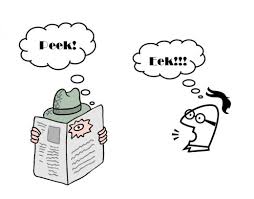
#8: PEEK/PEAK/PIQUE
PEEK means to glance quickly.
- If someone PEEKED at you without permission, you might say, EEK!
PEAK refers to the highest point of a mountain.
- If you climbed to the PEAK of Mount Everest, you would be so out of breath, you couldn’t SPEAK!
PIQUE means to spark interest or irritate: Though I can’t come up with a clever mnemonic for this, I suggest you focus on the QUE at the end. This makes a great Scrabble word!
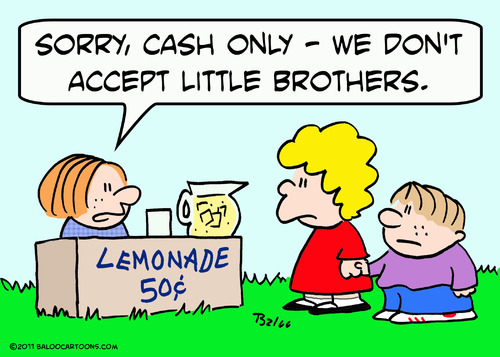 #9: ACCEPT/EXCEPT
#9: ACCEPT/EXCEPT
ACCEPT means to consent to receive or come to believe.
- Cinderella ACCEPTED Prince Charming as her husband and no doubt found the castle more ACCEPTABLE than her previous ACCommodations.
EXCEPT means excluding. The Greek root EX means out of, without.
- Everyone got invited to the party EXCEPT for Wanda (boo-hoo). The host refused to make any EXCEPTIONS to her list.
I sincerely hope you found this two-part series helpful! I’ll leave you with a list of useful grammar resources:
Grammar Girl’s Quick and Dirty Tips for Better Writing, by Mignon Fogarty.
Painless Grammar by Rebecca Elliott, Ph.D.
www.grammarly.com and its blog
By our very own Marianne Knowles: 10 Word Pairs Even Experts Mix Up


Laura, you’ve done it again! An excellent post that I will be bookmarking and referring back to often! Thank you so much for all the time you put into this!
LikeLiked by 2 people
Gee thanks, Kim! I’m deeply flattered by your kind words, and am so glad you find this bookmark-worthy.
LikeLiked by 1 person
Great explanations for words that often trick the unwary.
LikeLiked by 2 people
Thanks, Norah! I’m glad you liked my explanations. And I really like “words that often trick the unwary.”
LikeLiked by 2 people